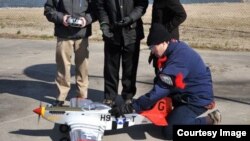The U.S. Navy may have discovered a way to make fuel from seawater.
Researchers at the U.S. Naval Research Laboratory say they’ve developed a prototype technology for the “recovery of carbon dioxide and hydrogen from seawater and conversion to a liquid hydrocarbon fuel.”
Using the technique, the Navy was able to fly a model airplane with an internal combustion engine using fuel from seawater, according to the Navy, which called the technology “game changing.”
The process extracts carbon dioxide and hydrogen from the seawater and converts those gases into “liquid hydrocarbons by a metal catalyst in a reactor system,” according to the Navy.
Despite the success, the technology could be seven to 10 years away from commercial viability, meaning the process would have to produce jet fuel at the price of roughly 78 cents to about $1.60 per liter, according to the Navy.
A Navy admiral responsible for fleet readiness and logistics told the UK’s Daily Mail that the Navy was in “very challenging times” regarding energy.
“We need to challenge the results of the assumptions that are the result of the last six decades of constant access to cheap, unlimited amounts of fuel,” he told the Daily Mail. “Basically, we've treated energy like air, something that's always there and that we don't worry about too much.”
Here's a video about the test flight:
Researchers at the U.S. Naval Research Laboratory say they’ve developed a prototype technology for the “recovery of carbon dioxide and hydrogen from seawater and conversion to a liquid hydrocarbon fuel.”
Using the technique, the Navy was able to fly a model airplane with an internal combustion engine using fuel from seawater, according to the Navy, which called the technology “game changing.”
The process extracts carbon dioxide and hydrogen from the seawater and converts those gases into “liquid hydrocarbons by a metal catalyst in a reactor system,” according to the Navy.
Despite the success, the technology could be seven to 10 years away from commercial viability, meaning the process would have to produce jet fuel at the price of roughly 78 cents to about $1.60 per liter, according to the Navy.
A Navy admiral responsible for fleet readiness and logistics told the UK’s Daily Mail that the Navy was in “very challenging times” regarding energy.
“We need to challenge the results of the assumptions that are the result of the last six decades of constant access to cheap, unlimited amounts of fuel,” he told the Daily Mail. “Basically, we've treated energy like air, something that's always there and that we don't worry about too much.”
Here's a video about the test flight:





